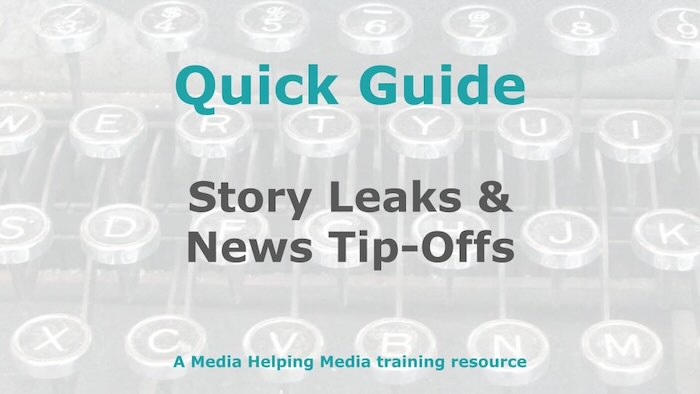 Receiving a tip-off about secret information or getting hold of a leaked document is guaranteed to quicken the pace of a journalist’s heart rate.
Receiving a tip-off about secret information or getting hold of a leaked document is guaranteed to quicken the pace of a journalist’s heart rate.
Here is a chance to publish or broadcast an exclusive story which might make the headlines and influence the daily news agenda.
But beware: a critical factor in handling and disseminating leaked material is the need to take account of the motives of the leaker.
Why is the information being leaked?
Is this a genuine leak coming from an insider who has privileged access to private data which the leaker believes should be out there in the public domain?
Or is the leak perhaps part of a calculated attempt to influence the news media?
A newspaper or broadcaster might have become the targeted recipient of secret information in the hope this will secure timely, and potentially sympathetic, news coverage for a particular cause or faction or perhaps embarrass an opponent.
Journalists need to realise they are in danger of being used for malign or even malicious reasons.
Today’s propagandists – known as spin doctors in the world of politics – are increasingly adept at manipulating the news media.
The pressure of the exclusive
Journalists are not entirely blameless. Often the pressure to secure an exclusive story is so great that a reporter or correspondent might be only too happy to oblige.
What needs to be understood is that a critical power in the hands of political or commercial spin doctors is their ability to pick and choose the recipients of planted information – data that might be secret or confidential but which if leaked to the news media might boost a politician, public figure or business interest or alternatively might damage the image of a rival or competitor.
When I researched the growth in exclusive stories based on leaks and tip-offs, I realised that most of them are being secretly released not necessarily to alert and inform the public but instead for a calculated, political purpose, hence the title of my book, Trading Information.
In no way am I seeking to denigrate what might be regarded as a principled leaker, someone who is perhaps handling secret or confidential information at work and who, because they think the public are being misled, is prepared to take an enormous personal risk to find a way to release that data to a journalist or to a news outlet.
The speed and spread of leaks
Rapid advances in electronic communications have transformed the way secret or confidential information can be distributed anonymously without official permission.
Increasingly in the paperless era of today a tip off or secret data might be delivered via an email or social media rather than in a plain envelope sent through the post.
Reporters and editors must realise and understand the heavy responsibility they shoulder. By their action leakers might have put themselves in grave danger if there is any likelihood of their identity being revealed.
Self-respecting journalists are duty bound to protect the identity of their sources and that applies particularly to anyone who has jeopardised their own livelihood to ensure vital information reaches the public domain.
While such action might be judged misguided and sometimes against the national interest by those in authority, public opinion is often likely to be on their side.
If there is any suspicion that politicians or public officials are lying – and if the objective is to expose the duplicity of officialdom and rectify that – then the leaker will be considered by many people to be a hero rather than a villain.
Leaking case-studies
A ground-breaking case in 2003 involved Katherine Gun, a translator at GCHQ, the UK government’s secret communications centre in Cheltenham, who added her name to a roll call of Britain’s most-celebrated post-war whistleblowers.
She had sent the Observer newspaper a copy of a document which she had printed off at work and which revealed American attempts to bug the phones of members of the UN Security Council during the lead-up to the Iraq War.
Gun was charged under the Official Secrets Act with having disclosed classified security and intelligence information but five days before her trial at the Old Bailey the Crown Prosecution Service said it would offer no evidence against her.
Government lawyers had concluded that no jury would find her guilty, such was the public sympathy for a young translator who had “bravely risked her career and her very liberty to inform the public about illegal spying”.
What emerged in Gun’s case was a revealing pattern of behaviour among leakers. She had sent the document to the Observer because she admired the newspaper’s critical stance on the Iraq War, and she believed its journalists would make the best use of the information.
I found the same motives had come into play two decades earlier during the UK’s most violent industrial dispute of recent decades when the National Union of Mineworkers challenged Conservative Prime Minister Margaret Thatcher during the 1984-85 strike against pit closures.
Arthur Scargill, the union’s president, told me he had received unsolicited leaks of confidential information about the secret plans of the government, Police and National Coal Board – leaks which he quoted in media appearances to bolster support for the strike.
Insiders sympathetic to the miners’ struggle had sent him copies of sensitive information. Usually, he said, the documents came in the post without any indication of the sender’s identity.
Leaks supplied during the strike to newspapers and broadcasters were delivered in a similar fashion.
I managed to track down some of those who had made copies of documents and data and posted off the material. They often addressed their envelopes to an individual reporter or correspondent, perhaps because they admired the way the journalist was reporting the strike, in the hope their information would be of assistance.
Back in the 1980s when the act of leaking was regarded far more seriously by the state, the UK government went to great lengths to identify the culprits and take them to court.
Unlike the case of Katherine Gun where a prosecution under the Official Secrets Act was withdrawn, Sarah Tisdall, a young civil servant in the UK Foreign Office, spent four months in prison in 1983 after she supplied the Guardian with documents detailing the arrangements for the delivery of Cruise missiles to the US Air Force base at Greenham Common.
Her leak was welcomed by peace campaigners who had been staging widespread demonstrations against Nato’s decision to build up its nuclear stockpile in response to the threat posed by the Soviet Union.
Tisdall, a clerk in the Foreign Secretary’s private office, believed that the Secretary of State for Defence intended to mislead Parliament and the British public about the deployment of Cruise missiles.
After the Guardian was ordered by the courts to surrender its material to the Police, Tisdall was identified because of tell-tale marks in the top right-hand corner of one of the pages.
Her imprisonment shocked the Guardian’s then editor Peter Preston who blamed himself. Nobody at the paper knew of the leaker’s identity until her arrest.
When faced by the prospect of a raid by the Police Special Branch, Preston was advised by the paper’s lawyer to pledge not to destroy the document which had been delivered in a brown envelope addressed to the political editor.
After 20 years had elapsed Preston reflected on what his obituary subsequently described as his dreadful anguish over his mishandling of the leak and what he acknowledged was his betrayal of Sarah.
“The devil was that I’d signed on behalf of a company facing brutally escalating fines for non-compliance…The blanked-out hieroglyphics top right, which had seemed like a clue, were meaningless. But Sarah had used a Foreign Office copying machine and that helped track her down.”
To protect future potential sources Preston had immediately instructed his journalists to obliterate and shred all secret or confidential documentation as soon as details had been printed in the paper.
A more relaxed attitude to leaking
Four decades on news organisations tend to take a more relaxed approach especially in cases where the information has been supplied surreptitiously by a source known to the journalist in what appears to be a targeted disclosure.
Press reports and broadcasts regularly reproduce a key sentence or extract from planted leaks of this nature to illustrate and verify story lines which usually relate to the internal affairs or disputes within government, politics or business.
Sometimes highly sensitive documents might have been mislaid or lost by civil servants or military personnel, perhaps left on a train or at a cafe, or even found lying in the street.
In the first instance, finders of such documents often pass them on to news organisations rather than hand them in to the authorities; they like the idea that their find might be in the headlines.
The responsibility of journalists
Nonetheless care should always be taken by journalists to avoid revealing data such as personal details, home addresses or sensitive dates, timings and locations which relate to the future whereabouts of politicians or public figures.
Newsrooms must always be on their guard if there is any danger that publication or broadcast of leaked information might threaten national security. Such incidents can and do lead to prosecutions.
Although journalists and their editors understand why precise details must not be disclosed, there are still plenty of potential story lines.
The emphasis can easily be switched to highlighting the fact that the leak – and the carelessness of whoever was involved – presented a serious breach of security.
In my 65-year career as a journalist I have been sent, or have found, a variety of leaked documents. Most of those I received were forwarded to me with the expectation I would make use of the information.
On several occasions the documents concerned had clearly been lost or mislaid, and I just happened to find them. I made a note of the contents, and sometimes they were of use, but I always made sure I returned them if there was an appropriate address.
My motto was better to be safe: there have been prosecutions for receiving or handling stolen documents and my fear was that if such documentation was ever found in my possession, I would have little or no justification for having failed to return the material.
By Nicholas Jones, author of Trading Information: Leaks, Lies and Tip-offs









